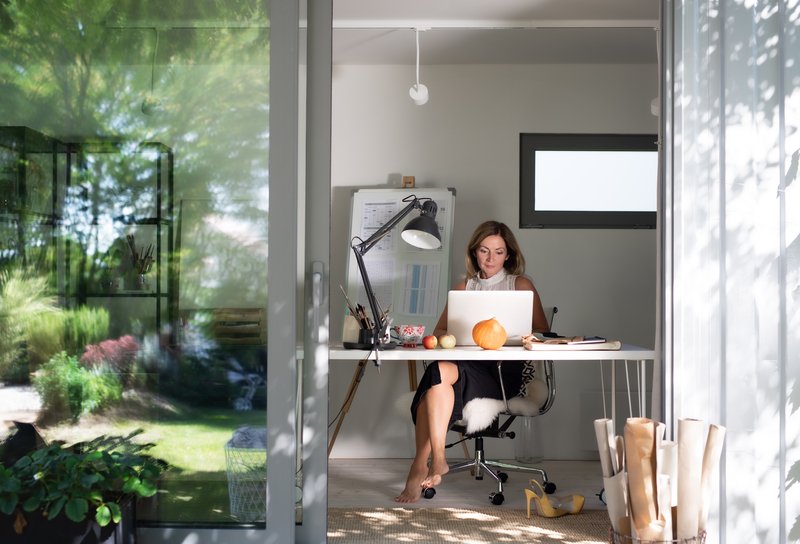Most new businesses are started from home. But with space at a premium and other pressures – such as COVID-19 – making households busier than ever, might buying a garden offer a solution for your startup? And, what if you want to reclaim the costs via your small business?
Starting a business from home very sensible way to get going. You remove a lot of the financial risks by operating from premises you are already paying for. And it’s a lot easier to make the right decisions early in the life of your business if you’re not waking up each day wondering how you’re going to pay the bills.
A useful solution for space-starved entrepreneurs
As your new venture grows you may find your business has outgrown your spare bedroom. You might need extra space, or perhaps want to take on staff without them tramping around your house. Or maybe you have clients visiting your home and want to present a better image.
If you can’t be doing with the hassle or expense of renting or buying business premises, there is another option that carries many of the benefits of working from home, but can also solve some of the problems.
Welcome to garden office buildings. These are purpose-built buildings that are installed in your garden or anywhere else on land you own. And makers claim they are changing the way people work from home.
Typically the buildings are made out of wood and other long-lasting materials, and are assembled in a modular way (in the same way you buy the walls and roof of a shed ready-made). You can get them big enough for just one person, right up to those big enough for three or four.
They’re not permanent buildings, but are strong enough and will last long enough that you can run a business from them. And they carry the benefit of having a one-off cost, rather than an ongoing rental commitment.
Garden offices – things to consider before taking the plunge
We’ve looked at a number of different UK suppliers, including Henley Offices and The Garden Escape.
Planning permission
Many garden offices have been specifically designed to slip under the planning rules. Because they don’t need foundations they count as a temporary building like a shed. However you may need to seek permission if your garden is very small, you live in a conservation area, or you are expecting a lot of visitors. Most suppliers will offer guidance.
Installation
Many suppliers put together their buildings on site. Depending on the size of the building this can be done in one day, as most parts are pre-assembled during manufacture. It also means the flat parts can be carried through your house if you don’t have direct access to your back garden. You don’t need to worry about a concrete base, but it is advisable to put slabs down first.
Cost
While garden offices carry the convenience of other garden buildings, they don’t carry the price tags! You’re buying a proper pre-fabricated building and have to pay for it. Expect to spend a few thousand pounds on a small office, right up to £20,000+ for big buildings you can put employees in. Some manufacturers custom-design a building for you, with quite a price tag attached.
Electricity
Because the buildings are specifically designed to be offices and not just outbuildings, they contain electricity sockets ready wired and ready to go. All you will need to do is get an electrician to connect the building to your house. Typically they will bury the cable they use for this, so there will be little visual disruption to your garden.
Heating
These are proper buildings, not sheds, meaning many benefit from insulation and double-glazing. You may still need an electric heater or portable gas heater. Remember that you will be sat in a wooden building, so you will need to take fire precaution risks such as having extinguishers on site. If you have other people working from the office you will need to ensure it complies with the current fire regulations.
Connecting to the outside world
Thanks to advances in wireless communications, you won’t need to spend a fortune laying a phone line out to your garden office. Depending on its distance away from the house, a wireless router and cordless phone should work fine. You can buy booster units if you are lucky enough to have a very big garden. Remember to test the signal before positioning your garden office. If these solutions aren’t realistic, many mobile plans now offer unlimited data, or you could buy a mobile (4G) dongle.
Security and insurance
Most garden offices are sturdily built with proper doors and locks. And that means that many insurance companies will happily include them on your domestic insurance policy. Some manufacturers make extra high-security versions. There are certainly extra precautions you can take, such as removing your laptop from the building at the end of each day.
Downsides
You might have moved your office into the garden, but you will still be working from home and will need the discipline that goes with that. It’s easy to “just pop outside” for a few minutes and still be there at midnight. Get into good habits early on, such as having a clearly defined end to your day, and keeping home and office life as separate as you can.
What about the tax treatment of garden offices?
You won’t be surprised to hear that this is where things get complicated, as there are several types of tax involved. And the tax treatment varies slightly, according to whether your business is a sole tradership or a limited company.
You may be able to reclaim the VAT element of the construction and fitting costs, although this will only be possible if you’re on the standard, not Flat Rate VAT, schcme. If you’re a sole trader, you will have to make an adjustment to the percentage of VAT reclaimed, if there is any personal use of the office space.
There might be a theoretical Capital Gains Tax issue upon the sale of your property, but this is unlikely unless you have constructed a bricks and mortar (proper) office.
The construction costs of building your office cannot be offset against your Corporation Tax bill if you are a limited company, although all business types may be able to claim some costs via the system of capital allowances.
Theoretically, your local council might decide to apply business rates to your office structure. However, in the unlikely event that this happens, given the size of the structure, it would almost certainly be exempt due to the small business business rates relief scheme.
Additionally, if there is a mixed use of the structure (i.e. it’s used as an entertainment area as well as office space), there might be benefits in kind charges for the personal use.
- David Hughes from Rodcliffe Accounting has written a very comprehensive breakdown of the tax considerations for limited company owners here. And read another accountant’s summary here.
- Here’s a useful summary of the situation for sole traders and partnerships who want to reclaim the costs of building a garden office.
- Another good guide on running a business from a garden office from Garden Affairs.
As you can see, if you do want to claim for the cost of constructing a garden office, we strongly urge you to talk to your accountant first.
Subscribe to ByteStart's monthly small business owners' newsletter!

|
Free Tide Business Bank Account - up to £150 Cashback!Simply open a free business current account to qualify + 12 months free transactions. Read our Tide review. Open a Tide savings account at the same time and earn an excellent 4.07% AER (variable) on your spare funds. |











